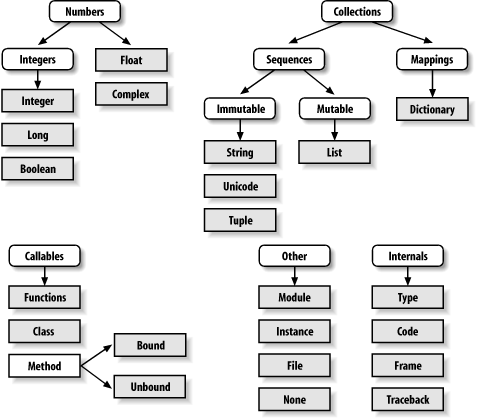layout: true class: middle --- # Building blocks of object orientated systems - Classes - Objects - Methods ```python from datetime import date a = date(2016, 1, 1) a.weekday() ``` .footnote[Python Version: 2.7] ??? - Usually classes are camelcase but sometimes Python is inconsistent - Show Class/Object/Method in the code --- # (nearly) everything in Python is an object! ??? Everything is an object: ``` >>> a = 5 >>> a.__class__ <type 'int'> >>> type(a) <type 'int'> >>> id(a) 38428920 ``` More strict: Smalltalk ("if" and loops are object-methods) Less strict: Java ("primitive" types) Objects get recycled: ``` >>> b = 5 >>> id(b) 38428920 ``` This works because most of the simple datatypes in Python are immutable. --- class: middle # ... but it doesn't enforce object oriented code ```python def add_five(number): return 5 + number result = add_five(2) print result ``` ??? Show in repl: ```python type('add_five') a = 5 type(a) dir(a) a.__add__(3) help(a.__add__) ``` - Operator overloading in other programming languages - __??? is a Python convention --- # ... without 'syntactic sugar' ```python class AddFiveClass(object): def __call__(self, number): return int(5).__add__(number) add_five = AddFiveClass() result = add_five.__call__(2) print result.__str__() ``` ??? This is not exactly what's happening but it is a pretty good aproximation. --- # Implementing + ```python class SuperNumber(object): def __init__(self, number): self.number = number def __add__(self, other): return self.number + (other * 2) a = SuperNumber(5) a + 3 ``` ??? Explain: __init__ Show also: ```python a - 3 a.__sub__(3) ``` Contracts: "If one of those methods does not support the operation with the supplied arguments, it should return NotImplemented."" https://docs.python.org/2/reference/datamodel.html#emulating-numeric-types Old-style class vs. new-style class --- # Learned so far: - Python built-in functions: - `id` - `type` - `dir` - Simple types in Python are immutable and get reused - A lot of 'syntactic sugar' in Python calls magic methods behind the scenes - Contracts - Magic methods: - `__init__` - `__add__` - `__sub__` - `__call__` --- # Modifying attributes ```python class X(object): def __getattribute__(self, name): print("You accessed " + name) def __setattr__(self, name, value): print("You set {} to {}".format(name, value)) x = X() x.a x.a = 3 ``` ??? Carefull: There is also __getattr__ which is only called if the attribute does not exist yet. --- # String methods ```python # repr(object) -> "official" string representation object.__repr__(self) # str(object) -> readable string represenation object.__str__(self) # unicode(object) -> readable string representation in with foreign characters object.__unicode__(self) ``` --- # Comparison 1 ```python class Name(object): def __init__(self, firstname, surname): self.firstname = firstname self.surname = surname jonas = Name('Jonas', 'Pfannschmidt') jonas2 = Name('Jonas', 'Pfannschmidt') jonas == jonas2 ``` --- # Comparison 2 ```python class object: def __eq__(self, other): return id(self) == id(other) ``` or ```python class object: def __eq__(self, other): return self is other ``` --- # Comparison 3 ```python class Name(object): def __init__(self, firstname, surname): self.firstname = firstname self.surname = surname def __eq__(self, other): return self.firstname == other.firstname \ and self.surname == other.surname jonas = Name('Jonas', 'Pfannschmidt') jonas2 = Name('Jonas', 'Pfannschmidt') jonas == jonas2 ``` --- # More comparison Old comparison method: ```python object.__cmp__(self, other) # returns -1, 0 or 1 ``` New comparison methods: ```python object.__lt__(self, other) # object < other object.__le__(self, other) # object <= other object.__eq__(self, other) # object == other object.__ne__(self, other) # object != other object.__gt__(self, other) # object > other object.__ge__(self, other) # object >= other ``` Don't forget about ```python functools.total_ordering() ``` --- # Hash 1 > An object is hashable if it has a hash value which never changes during its lifetime (it needs a __hash__() method), and can be compared to other objects (it needs an __eq__() or __cmp__() method). Hashable objects which compare equal must have the same hash value. --- # Hash 2 ```python class Name(object): def __init__(self, firstname, surname): self.firstname = firstname self.surname = surname def __eq__(self, other): return self.firstname == other.firstname \ and self.surname == other.surname def __hash__(self): return hash((self.firstname, self.surname)) name = Name('Jonas', 'Pfannschmidt') hash(name) ``` --- class: center, middle # Types  --- # Containers ```python class ThreeList(object): def __init__(self): self.value1 = None self.value2 = None self.value3 = None def __len__(): return 3 def __setitem__(self, key, value): if key == 1: self.value1 = value elif key == 2: self.value2 = value elif key == 3: self.value3 = value def __getitem__(self, key): if key == 1: return self.value1 elif key == 2: return self.value2 elif key == 3: return self.value3 x = ThreeList() x[1] = 'hello' len(x) ``` --- # Calling something ```python class X(object): def __call__(sel, args): print "You called with {}".format(args) x = X() x('test') ``` --- # Links - https://docs.python.org/2/reference/datamodel.html - https://docs.python.org/2/library/stdtypes.html - http://www.bpython-interpreter.org/